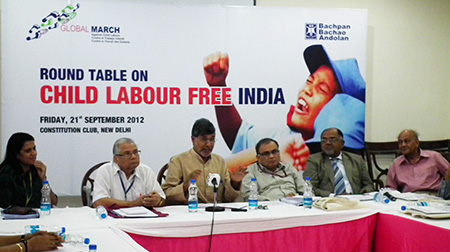New Delhi, 21 September 2012
The Roundtable discussion on Child Labour Free India was organised by Global March Against Child Labour in collaboration with its core partner Bachpan Bachao Andolan (BBA) bringing together Mr A C Pandey, Joint Secretary, Ministry of Labour and Employment, Mr Suresh Kumar, Joint Secretary, Ministry of Home Affairs, Dr Parveen Kumari Singh, Director, Ministry of Home Affairs, Dr L Mishra, former Labour Secretary of India, Mr U Saratchandran, Member Secretary, National Legal Services Authority, Ms Nina Nayak, Member, National Commission for Protection of Child Rights (NCPCR), Mr Ravi Wig, Council of Indian Employers, representatives from the labour department of Delhi, representatives from ILO, UNICEF and UNESCO, representatives from grassroots child rights organisations in India and eminent social scientists.
The roundtable discussion was organised for the key and strategic stakeholders of the civil society to brainstorm and provide concrete suggestions to the Ministry of Labour and Employment and other relevent ministries for a comprehensive and convergent child labour rehabilition and eduation policy in light of the Union cabinet’s approval for amendments in the child labour law, making child labour a crime and banning all forms of child labour till 14 years, and prohibiting the employment of adolescents between 14–18 years in hazardous work. This roundtable disucssion follows the two-days National Consultation on Child Labour Free India in on 11-12 May 2012 inaugurated by Minister of Labour and Employment Mr. Mallikarjuna Kharge.
The rich exchange and discussion proposed the following key suggestions:
- The implementation of a comprehensive child labour rehabiliation and education system must respond to the realities on the ground and socio-economic inadequacies;
- Strong linkages with the Right to Education Act and realising the provisions of the RTE;
- Recognising that there are constraints of the labour inpsectorate system, the Union Cabinets’ approval for bringing child labour into the criminal perspective by making it a cognizable offense would equip the police to respond promptly to the violations;
- A robust accountability strategy backed by a strong monitoring and evaluation mechanism which addresses the loopholes on the existing schemes;
- Improving the quality of the child labour rehabilitation and education scheme through better identification mechanisms, training of teachers, school infrastructure, etc.;
- Strenghtening education for children under 14 years and promoting skills development for the children between 14-18 years;
- Emphasising social protection for vulnerable families and promoting access and inclusion in government entitlements;
- Improving the delivery of the legislative provisions in the proposed amendments;
- Ensuring convergence with all the relevant ministries, department and governments schemes to ensure prevention, protection, rehabilition and education of child labour.
Mr Kailash Satyarthi, Chairperson, Global March Against Child Labour, summarised the roundtable discussion, “We are in very exciting times – we have been struggling to ban child labour for nearly three decades and we are watching our struggle bear fruit. The government, inter-government agencies, and civil society have come a long way. This meeting is a reflection of the intention, maturity and innovation towards collectively working towards a comprehensive and convergent rehabilition and education scheme for elimination of child labour with a deep sense of accountability.”


